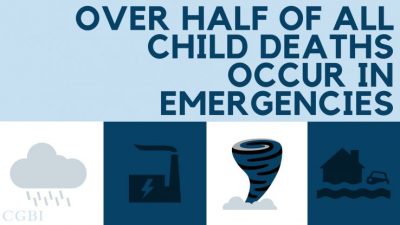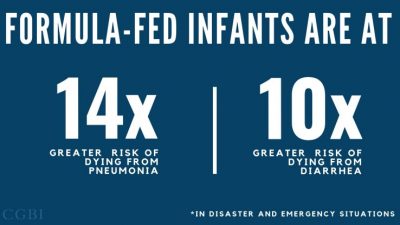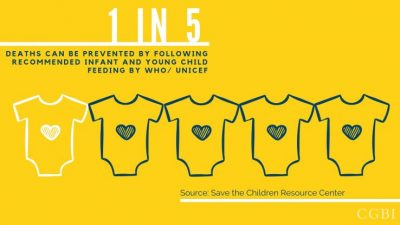Breastfeeding Institute responds to Hurricane Florence with support for infant and young child feeding
September 28, 2018
On September 14, Hurricane Florence arrived on the east coast of the United States and brought heavy rains and catastrophic flooding to parts of North and South Carolina. According to the American Red Cross, an estimated 82,300 people sought overnight shelter in the week after the storm passed through.
The Carolina Global Breastfeeding Institute, housed in the UNC-Chapel Hill Gillings School of Global Public Health’s Department of Maternal and Child Health, was among the first responders, helping to ensure that infants and children stayed safe and well-fed in the aftermath of the storm.
Emergencies threaten breastfeeding and safe formula feeding
 No matter where natural disasters occur in the world, they always disrupt access to basic necessities: clean water, clean air, sanitation, food security, and access to medical and health services. Newborns and infants are especially vulnerable to infections when hygienic conditions break down. The younger the infant, the higher the risks: More than half of all infant deaths around the world occur during emergencies.
No matter where natural disasters occur in the world, they always disrupt access to basic necessities: clean water, clean air, sanitation, food security, and access to medical and health services. Newborns and infants are especially vulnerable to infections when hygienic conditions break down. The younger the infant, the higher the risks: More than half of all infant deaths around the world occur during emergencies.
In North and South Carolina, Hurricane Florence has left a path of devastation. A public health situation report from the N.C. Department of Health and Human Services noted that, in many of the affected areas, weather conditions have disrupted food supply. WIC (the federal Special Supplemental Nutrition Program for Women, Infants and Children) remains unable to deliver supplies and food to some affected areas.
Families who have not been able to evacuate may currently lack access to food or – if needed – to acute medical care for their sick infants and young children. On the other hand, evacuation to a shelter often means infants and young children will be exposed to new infections associated with crowding.
Safe and sound nutrition are paramount to an infant’s growth and dramatically increase resistance to infections in the first 1,000 days of life. This is especially true in emergencies. It is well established that breastfeeding provides the greatest protection against diarrhea and upper respiratory infections, which often become rampant in emergency situations. This is the case because breastfeeding delivers immune cells and bioactive complexes, or passive immunity, from mother to baby.
 In the United States, however, the majority of infants are not breastfed. Non-breastfed infants are at a significantly increased risk of sickness during emergencies. Formula offers no immunological protection, and caregivers may not have the supplies needed to prepare and feed formula as safely as they would be able to in a non-emergency situation.
In the United States, however, the majority of infants are not breastfed. Non-breastfed infants are at a significantly increased risk of sickness during emergencies. Formula offers no immunological protection, and caregivers may not have the supplies needed to prepare and feed formula as safely as they would be able to in a non-emergency situation.
What’s more, many mothers who were breastfeeding well prior to an emergency may find that maintaining breastfeeding becomes a challenge when they are not adequately supported with safe spaces and skilled counseling. Overcoming this challenge is paramount, because when a breastfed infant stops breastfeeding or begins formula supplementation during an emergency, their risk of illness and death by diarrhea or pneumonia increases 14-fold.
How is CGBI helping during this crisis?
This is where the Emergency Nutrition Network (ENN) Infant and Young Child Feeding in Emergencies (IFE) Core Group Operational Guidance for Infant and Young Child Feeding is critical.
All infants require skilled support during emergencies. Organizations that deploy relief workers and volunteers must devote resources and training to ensure families receive the supplies, support and resources they need, no matter how they feed their baby.
 The principles of this support are simple: Protect breastfeeding and provide skilled, targeted support for non-breastfed infants. Following Hurricane Florence, the Carolina Global Breastfeeding Institute (CGBI) is supporting response efforts by building capacity for front line responders, community health workers and relief organizations to meet the critical nutritional needs of infants and young children in emergencies.
The principles of this support are simple: Protect breastfeeding and provide skilled, targeted support for non-breastfed infants. Following Hurricane Florence, the Carolina Global Breastfeeding Institute (CGBI) is supporting response efforts by building capacity for front line responders, community health workers and relief organizations to meet the critical nutritional needs of infants and young children in emergencies.
Along with access to skilled lactation assistance, CGBI advocates for intensive support and protection of infants in emergencies who are only partially breastfed or are exclusively formula-dependent. This support includes having relief workers and volunteers on the front lines who are trained in how to ensure that all children under two years of age receive safe nourishment.
To this end, CGBI has compiled a bundle of resources to support infant and young child feeding as part of their emergency response for Hurricane Florence. CGBI members also have been working with the International Medical Corps to place skilled infant feeding specialists in local emergency response units and shelters. CGBI experts are providing technical assistance to community health advocates working to support North and South Carolina families, including Momma’s Village of Fayetteville and La Leche League of North Carolina.

Catherine Sullivan
CGBI has a long history of working with hospital communities in the Carolinas through both the Centers for Disease Control and Prevention’s EMPower Breastfeeding and EMPower Training Initiatives and The Duke Endowment-funded ENRICH Carolinas project. Capitalizing on these connections, CGBI director Catherine Sullivan, MPH, has reached out to facilities in the affected areas and shared an electronic bundle of emergency feeding materials. CGBI also will distribute a printed manual to all facilities in devastated areas by the end of this week.
“Hospitals are often the primary source of medical care after a disaster,” Sullivan said. “CGBI’s goal is to put helpful materials into the hands of those doing the work on the ground.”
What are the long-term goals for education and training around emergency infant and young child feeding?

Dr. Aunchalee Palmquist
Aunchalee Palmquist, PhD, heads the Lactation and Infant Feeding in Emergencies (L.I.F.E.) Support Initiative at CGBI.
“It is incredibly difficult to provide education about how to support Infant and Young Child Feeding in Emergencies (IYCF-E) during an actual emergency,” she cautioned. “Emergencies are chaotic, people are worried about a thousand things, and they don’t have the time or frame of mind to listen to a lesson on the relative risks of infant feeding methods.”
“The time to build capacity for IYCF-E is well before the emergency,” she added. “From the grassroots community responders to the state level of emergency response, that premeditated education is what we aim to achieve across North and South Carolina. What I would most like folks to realize is that – regardless of whether a baby is exclusively breastfeeding or receiving formula – all infants and their caregivers need protection and support. We know very well how to do this. We just need to build the capacity to do it, so that skilled support is already firmly in place when it’s needed the most.”
CGBI actively contributes to the global advancement of IYCF-E initiatives through the IFE Core Group, the UNICEF and WHO Global Breastfeeding Collective, the World Alliance for Breastfeeding Action, Save the Children and the CORE Group Humanitarian-Development Nexus Task Force.
CGBI previously has supported IYCF-E responses in North America, following Hurricanes Harvey and Maria, by providing technical assistance to ASI Alimentación Segura Infantil in Puerto Rico and the Safely Fed Canada-USA Coalition.
Contact the Gillings School of Global Public Health communications team at sphcomm@listserv.unc.edu.
